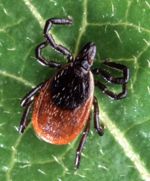Difference between revisions of "Arachnid Flashcards"
Jump to navigation
Jump to search
m |
m (→Ticks) |
||
| Line 81: | Line 81: | ||
|<big>'''What is the most important tick species in the UK, how many hosts does it feed upon and what disease can it spread?''' | |<big>'''What is the most important tick species in the UK, how many hosts does it feed upon and what disease can it spread?''' | ||
||<font color="white"> <big> | ||<font color="white"> <big> | ||
| − | *'''''Ixodes species'''' | + | *'''''Ixodes species''''' |
*'''''3 host tick''''' | *'''''3 host tick''''' | ||
*'''''Transmits Lyme Disease''''' | *'''''Transmits Lyme Disease''''' | ||
| Line 88: | Line 88: | ||
|<big>'''What climate does Rhipicephalus species prefer and what is it a vector for?''' | |<big>'''What climate does Rhipicephalus species prefer and what is it a vector for?''' | ||
||<font color="white"> <big> | ||<font color="white"> <big> | ||
| − | *''''' | + | *'''''Warmer climates'''' |
| − | *''''' | + | *'''''Theileria parva for East Coast Fever''''' |
| − | *''''' | + | *'''''Babesia bigemina''''' |
| − | ||[[Suborder: Metastigmata, ticks#Important | + | *'''''Babesia canis and Ehrlichia canis''''' |
| + | ||[[Suborder: Metastigmata, ticks#Important Overseas Hard Ticks|<span title="Answer article">Link to Answer Article</span>]] | ||
| + | |- | ||
| + | |<big>'''Name some important soft ticks''' | ||
| + | ||<font color="white"> <big> | ||
| + | *'''''Argas species'''' | ||
| + | *'''''Ornithodorus species''''' | ||
| + | *'''''Otobius species''''' | ||
| + | ||[[Suborder: Metastigmata, ticks#Important Overseas Soft Ticks|<span title="Answer article">Link to Answer Article</span>]] | ||
| + | |- | ||
| + | |<big>'''What are the main methods of tick control?''' | ||
| + | ||<font color="white"> <big> | ||
| + | *'''''Killing ticks on the ground'''' | ||
| + | *'''''Separate the host from infection''''' | ||
| + | *'''''Killing ticks on the host''''' | ||
| + | *'''''Enhancing stock resistance''''' | ||
| + | ||[[Suborder: Metastigmata, ticks#Control|<span title="Answer article">Link to Answer Article</span>]] | ||
|} | |} | ||
| − | |||
==<font color="purple">Mites</font>== | ==<font color="purple">Mites</font>== | ||
Revision as of 12:43, 7 January 2009
|
|
Arachnids
| Question | Answer | Article |
|---|---|---|
| What are the two divisions of the arachnid body? |
|
Link to Answer Article |
| Summarise the arachnid life cycle |
|
Link to Answer Article |
Ticks
| Question | Answer | Article |
|---|---|---|
| What are seed ticks? |
|
Link to Answer Article |
| How can you differentiate hard ticks from soft ticks? |
|
Link to Answer Article |
| True or False: Soft ticks can swell up to three times their body size whilst taking a blood meal |
|
Link to Answer Article |
| List the mouthparts of ticks |
|
Link to Answer Article |
| Fill in the missing words about soft and hard ticks | Soft ticks feed little and often and on many hosts. Hard ticks take one blood meal at each life cycle stage and can feed on one, two or three different hosts during their life cycle. | Link to Answer Article |
| What is trans-ovarian transmission and give an example of a species of tick which uses this |
|
Link to Answer Article |
| What is trans-stadial transmission? |
|
Link to Answer Article |
| What is the most important tick species in the UK, how many hosts does it feed upon and what disease can it spread? |
|
Link to Answer Article |
| What climate does Rhipicephalus species prefer and what is it a vector for? |
|
Link to Answer Article |
| Name some important soft ticks |
|
Link to Answer Article |
| What are the main methods of tick control? |
|
Link to Answer Article |
